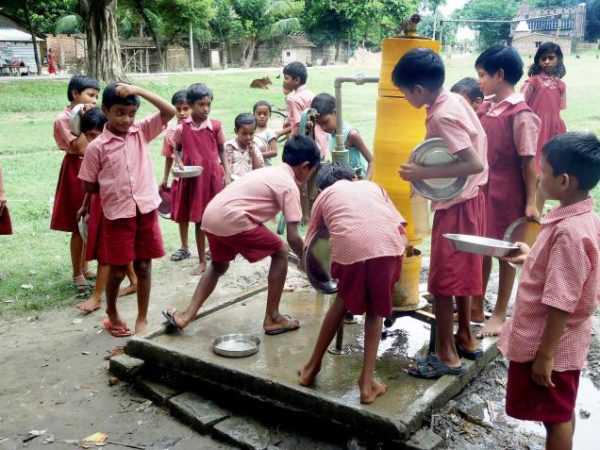Amrit water filter will soon dot many locations across the world where arsenic is a problem.
“I am glad that technologies from academic labs are getting venture funding in units of millions of dollars,” says Prof. T. Pradeep from the Department of Chemistry, Indian Institute of Technology, Madras. It was only a couple of days ago that he signed the final agreement with Nanoholdings based in Connecticut, U.S. wherein Nanoholdings will provide his team venture funding of $18 million (about Rs.120 crore) to further develop its nanomaterials-based water technology that is currently used in India to remove arsenic from drinking water.
For a person whose first research grant in 1994 was a meagre Rs.42,000 and slowly graduated to being funded in the range of Rs.2-3 lakhs, and the licensing fee from the first product (to remove pesticides from drinking water) he developed fetched him just Rs.3 lakhs, the bonanza funding is proof that researchers in India, especially in institutes such as IITs can dream and achieve big. That there is huge market and demand for good technologies that impact human lives positively has come out loud and clear in this case.
Prof. Pradeep’s basic research was funded by the Nano Mission of the Central government.
If each institute has at least a couple of researchers who can generate funding of this magnitude then it will change the research environment in the country and have a ripple effect that would energise many more to follow suit. Why should graduating students being offered mind-boggling salaries alone be the news of the day? “Is the day too far when professors’ substantial earnings from their own research work become the talk of the town?” Prof. Pradeep wonders.
Prof. Pradeep’s company, InnoNano Research Private Limited, started as a start-up at IIT Madras Incubation cell in 2008 and has now become a graduated company. “InnoNano leads the table in terms of innovation. It is a great example of how research in an academic institution like IIT can be commercialised and have an impact on the society. It is one of our successful graduated companies that we are proud of,” says Tamaswati Ghosh, CEO, IIT Madras Incubation Cell.
In the next three months, InnoNano will have a new research lab of 5,000 sq. ft. size operational at IIT Madras Research Park. The research lab will have around 10 research staff. “He is doing excellent research on nanotechnology, especially water filtration. Who better than our faculty member setting up a R&D lab and giving opportunity to students and Ph.D scholars,” says Rajendra Kumat Mootha, Chief Operating Officer of IIT Madras Research Park.
“I think our biggest strength is that while we focused on one area (water), we chose to learn and do everything in that area — technology and product development, manufacturing, conducting trials and reaching out to users. I think that’s the strength of most reputed tech companies today,” says Anshup, a B.Tech from IIT Madras and one of the co-founders of InnoNano Research. “It gives us and our users a sense of completeness.” Udhaya Sankar and Amrita Chaudhary are the other two co-founders.
Prof. Pradeep’s water filter, Amrit (Arsenic and Metal Removal by Indian Technology), installed in 750 locations in West Bengal, Uttar Pradesh, Bihar and Karnataka provides arsenic-free drinking water at a cost of less than 5 paisa per litre to nearly 500,000 people. It functions without electricity or running water; all it requires is gravity. It requires less than a minute of contact time for Amrit to purify the water of arsenic.
In December last year, the Ministry of Drinking Water and Sanitation had recommended the replication of the nanotechnology-based purifier in all States where drinking water is contaminated with arsenic. Punjab has just initiated steps to procure filters for the State.
A community plant capable of filtering both arsenic and iron has been operational in Nadia, West Bengal since 2013. It provides 200,000 litres of water per day at about 4 paisa per litre.
With this venture funding, Amrit will soon dot many locations across the world as arsenic is a global problem. Besides purifying arsenic-contaminated drinking water, Nanoholdings wants the technology to be able to filter fluoride, natural iron and industrial pollutants such as lead, mercury, cadmium, and copper.
A water filter capable of removing fluoride is already close to commercialisation. And the research team has already been working on an all-in-one water purifier to address a wide spectrum of contaminants like pesticides, mercury, cadmium, lead, fluoride and arsenic.
“There is further scope for development of this technology. We want to make it more robust so that it can be used anywhere in the world,” says Bhabendra Pradhan, Chief Technology Officer at Nanoholdings.
“We expect to complete the development by five years.” A new manufacturing facility of 10,000 sq ft will become operational soon to supply water filters for the international market. The location of the manufacturing unit has not been finalised yet. InnoNano already manufactures water filters at its 8,000 sq ft Ambattur facility in Chennai to meet India’s demand. “All of these were possible only because some of our own students decided to take this as their life” he says.



Leave a reply